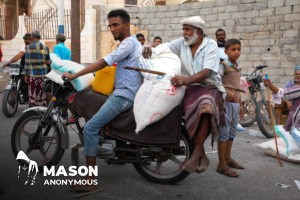Guterres hails historic Convention banning violence and harassment at work
A landmark international agreement banning violence and harassment in the workplace has been applauded by UN Secretary-General António Guterres, after it was adopted on Friday at the International Labour Organization’s (ILO) Centenary Conference in Geneva.
In his speech to delegates in the Swiss city, Mr. Guterres congratulated Member States for “building upon a legacy of achievement, guided by that age-old vision of social justice through social dialogue and international cooperation”.
Read the story in full here.
UN food agency begins partial withdrawal of aid to Houthi-held Yemeni capital
The World Food Programme (WFP), the UN’s emergency food relief agency, confirmed on Friday in a statement that it has started a “partial suspension” of aid to areas of Yemen controlled by Houthi opposition forces, including the capital, Sana’a.
Spokesperson Hervé Verhoosel briefed journalists in Geneva that the agency took the decision after efforts failed to prevent aid being diverted from those who need it most, despite repeated warnings:
“In any conflict areas, some individuals seek to profit from preying on the vulnerable and diverting food away from where it is most needed”, he said. Read the full story here.
Guterres encourages Mauritanians to come out and vote in historic poll
On the eve of the presidential election in Mauritania, UN chief António Guterres issued a statement encouraging “the Mauritanian people to exercise their right to vote”, describing the election as “an important step in the country’s democratic process.”
“The Secretary-General calls on all stakeholders to ensure that the polls are conducted in a peaceful and credible manner” said a statement issued by his Spokesperson. “He further urges them to resolve any disputes that may arise through established legal channels.”
It’s expected to be the West African nation’s first peaceful transfer of power, since independence from France in 1960.
Sitting President Mohammed Ould Abdel Aziz is stepping down after serving two five-year terms, since taking power in a coup in 2008, according to news reports.
We need to honour Jamal Khashoggi’s memory with justice for his murder: rights expert
Accountability for the murder of dissident Saudi journalist Jamal Khashoggi will be difficult to prove, but it is nothing less than the international community owes him, the UN-appointed independent rights expert involved in investigating his death has said.
In an in-depth interview in Geneva with UN News reporter/producer, Daniel Johnson, Agnès Callamard, Special Rapporteur on extrajudicial, summary, or arbitrary executions, suggests which tools might help to make this happen.
Righting a wrong: UN Fund helps thousands of sex abuse survivors rebuild their lives
About 3,340 women, children and men have been given support to restart their lives after falling prey to sexual exploitation or abuse (SEA) by United Nations personnel, thanks to a Trust Fund established in 2016.
On Friday, a meeting was held at UN Headquarters in New York, to report on the progress and impact made, and collect new pledges from Member States.
Find the full story here.
Crackdown on Christians in Eritrea spurs UN expert to press Government ‘to live up to its international commitments’
Cracking down on Catholic Church activities, arbitrary arrest and imprisonment of Orthodox and Christian congregation members in Eritrea, prompted a call from a UN independent rights expert on Friday for the Government to respect citizens’ freedom of religion and to “release those who have been imprisoned for their religious beliefs”.
“These actions show that, despite the improved regional climate for peace and security, the human rights situation in Eritrea remains unchanged,” said Daniela Kravetz, Special Rapporteur on the situation of human rights in Eritrea.
On 12 June, Eritrean authorities ordered all Catholic Church-managed health centres to be seized. According to information received, soldiers were posted outside some health facilities, patients were ordered to go home, and staff threatened.
The story in full is here.
Central African Republic food crisis, a wake-up call to global community: OCHA
To the Central African Republic now, where WFP has called for help from the international community to stave off severe and acute food shortages.
After years of ongoing conflict and mass displacement, nearly half the country’s people – more than 1.8 million – do not know where their next meal is coming from.
Of that number, more than 460,000 are expected to face emergency food insecurity during the current lean season, which lasts from May until August.
Among the areas worst affected are those hosting hundreds of thousands of people displaced by violence and insecurity.
Amid reports of regular attacks by armed groups who did not sign the deal, on major supply routes and around major cities, WFP says it needs more than $33 million to help 800,000 people every month until the end of the year.
DPRK at crossroads as UN independent investigator sees no improvement in people’s rights
And finally to DPRK, or North Korea, where UN-appointed independent rights expert, Tomás Ojea Quintana, has appealed to the State to ease people’s suffering.
Speaking at the end of a five-day mission to Seoul in South Korea, Mr. Quintana, expressed regret that he did not see any sign of improvement in the human rights situation of people in DPRK, before urging “profound legal and institutional reforms”.
Citing various sources in a new report, the expert spoke of “public executions…carried out by gunfire”, after trials between 2013 and 2017.
Victims faced charges including murder and drug dealing, he said in his report, while also noting that people continue to live in fear of being sent to political prison camps for watching South Korean soap operas.
In a statement, Mr. Quintana urged the Government of the DPRK to “be open about the political camps, which are called “kwanliso.”
At the same time, he called on the Government of China not to repatriate North Korean escapees, asking them to “give the primary consideration to what will happen to the escapees if repatriated to North Korea”.
Listen to or download our audio News In Brief for 21 June on SoundCloud:








